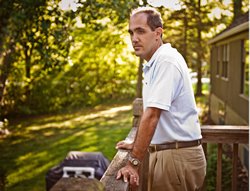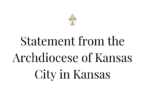
Jason Salinardi’s brother Richie was killed when the second plane hit the south tower of the World Trade Center on 9/11. Jason wears Richie’s watch as a reminder of the brother he lost.
by Joe Bollig
joe@theleaven.org
Richie Salinardi Jr. could have pushed his way onto a crowded elevator, but he didn’t. In an act of graciousness, he yielded to others.
After the attack on World Trade Center 1, people in World Trade Center 2 (the south tower) began to evacuate. The 32-year-old married Salinardi was Aramark Corporation’s general manager of food services on the observation deck. He generally worked between the 102nd and 104th floors of the 110-story building.
Salinardi, his co-workers and others made it to a sky lobby on the 78th floor in the process of evacuating. One witness remembers him saying he’d catch the next one. When last seen, he was chatting and joking with a co-worker.
Before the elevator would return, however, United Airlines Flight 175 hit the south tower between the 78th and 84th floors at 9:03 a.m.
Most of those who worked above the impact zone survived because they’d evacuated before the jet struck. In fact, only a handful escaped from above the zone after the jet struck. Although it would not be certain for a time, Salinardi was not among them.
Battalion Chief Orio Plamer and members of Ladder Company 15 made it to the 78th floor sky lobby at 9:52 a.m., where they discovered numerous civilians, many wounded. Before the firefighters could rescue them, World Trade Center 2 (south tower) collapsed at 9:59 a.m.
Meanwhile that day, Jason Salinardi, Richie’s little brother, had just begun his second semester at the University of Missouri School of Law in Columbia, Mo.
Jason Salinardi had just finished a class and was walking to his car when a law school friend, walking the other way, asked him if he’d heard what happened in New York City.
“She said, ‘Planes have crashed into the World Trade Center.”
“My first thought was, ‘[It’s] a small plane, no big deal,’” said Salinardi, now a member of Curé of Ars Parish in Leawood.
But then she told him it was a large plane — and it was probably a terrorist attack.
“Obviously there was a look on my face she read, because she said, ‘What’s wrong?’” said Salinardi. “I said my brother works in the World Trade Center, and her face went blank.”
Salinardi hurried home and called his parents in St. Louis, then another older brother, who was in San Francisco at the time.
“We made a lot of calls,” recalled Salinardi. Since his folks were natives of Hoboken, N.J., they “still have a lot of family in Hoboken and the surrounding area.”
It was hard to reach anyone on the East Coast because of interruptions to the telephone service. Two concerned friends showed up and drove him to St. Louis, and from there, he and his parents drove 16 hours straight to Hoboken to find out what happened to Richie.
“Sixteen hours — there was a lot of silence, under the circumstances,” said Salinardi.
Hoboken, with more than 50,000 people on only two square miles, sits directly west across the Hudson River from Manhattan. The Salinardi family arrived the morning of Sept. 12.
“You could see the smoke and the dust,” he said. “That’s all you could see of Lower Manhattan.”
Salinardi was pessimistic about Richie’s odds for survival. Resourceful man that he was, Salinardi believed that had Richie survived, he would have found a way to contact them.
Upon their arrival in Hoboken, they stayed in a cousin’s apartment, from which they spent the next few weeks calling, checking Internet sites and visiting hospitals.
“There’s a hospital a couple of blocks from the [World Trade Center] site,” said Salinardi. “I talked to a couple of police officers [there] and explained the situation. They drove me down to the restricted area, to the closest hospital. Everything was covered with inches of debris and ash.”
Eventually, after Salinardi and his family had exhausted every avenue open to them, everyone went home. A memorial service was held for Richie in November that year in St. Louis. Later, some of Richie’s remains were identified through DNA.
Salinardi became an attorney, got married, and is now raising two girls. He wears Richie’s watch daily, which he inexplicably didn’t wear on 9/11. He hopes the watch, and its story, will be passed down through the generations.
“One of my favorite quotes is from Richard Stone: ‘After you’re gone, all that’s left is your story,’” said Salinardi.
“If I share the story behind it, the watch becomes so much more valuable in a non-monetary sense,” he said. “To a certain extent, [9/11] shapes how I try to live my life and my practice [as an attorney.]”
“I try to convey how important it is to tell your stories, how you truly leave a legacy,” Salinardi continued. “My brother did that, unbeknownst, just through a watch. If people are proactive, they can do it to a larger degree and even more far-reaching.”
Salinardi returned to Ground Zero on the fifth anniversary to be among the siblings who read the names of their deceased brothers and sisters.
“This year we’re going back,” he said.






